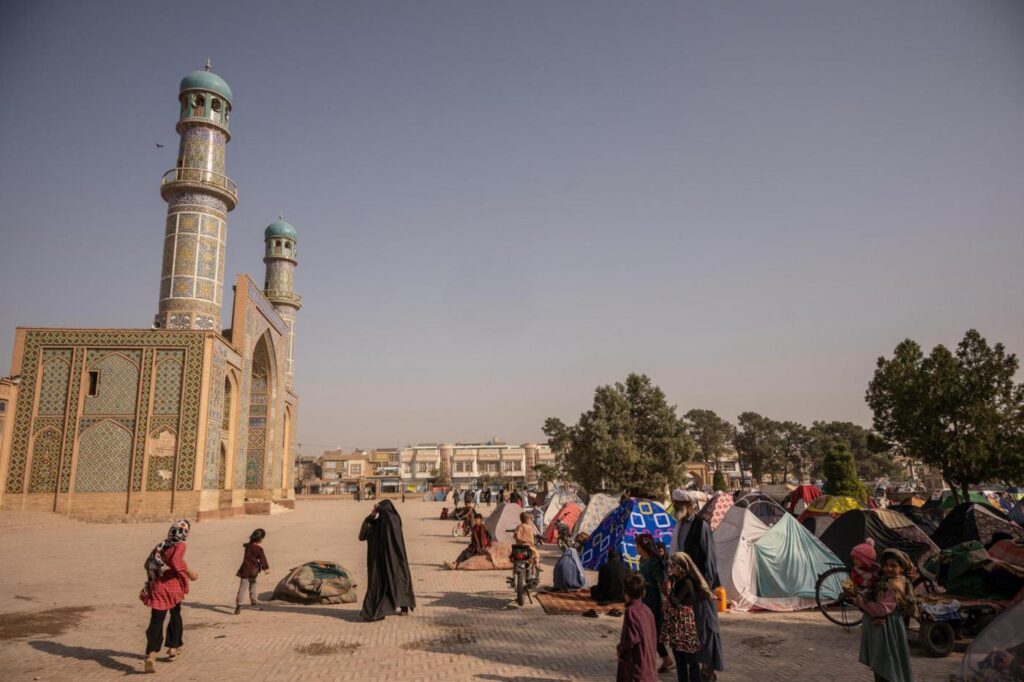
KABUL, Afghanistan — Two powerful earthquakes struck Herat province in northwestern Afghanistan early Sunday, jolting a region already hit by three major quakes over the past eight days that have killed more than 1,000 people.
The magnitude 6.3 and magnitude 5.4 temblors struck the province just after 8 a.m. local time at a depth of about 6 miles, according to the U.S. Geological Survey. The epicenter of the quakes was around 20 miles northwest of Herat City, the provincial capital and a major economic hub near the country’s border with Iran.
At least two people died and more than 150 people were injured in Sunday’s quakes, according to Masoud Danish, the director of the Herat governor’s office.
The episode Sunday capped an already devastating period in Herat. It began on Oct. 7, when two major earthquakes hit the region, killing around 1,300 people and injuring about 1,700 more in the country’s deadliest natural disaster in decades, according to the United Nations.
Those quakes decimated entire villages in Zinda Jan district outside the city, turning clusters of mud-brick homes scattered across the desert into little more than piles of rubble.
Days later, another magnitude 6.3 quake hit just outside the city, injuring around 120 people and rattling Herat residents who were already on edge after the initial quakes. Thousands of people left their homes to live in makeshift tents scattered across the city, terrified of another tremor that they feared could bring buildings crashing down around them.
Related: See a video from Aghanistan after earthquake
Then, early Sunday, those fears were realized.
Mohammad Ghaznawi, 30, had been sleeping in a tent with his wife and two children in a park on the outskirts of the city after the first quakes struck. On Sunday morning, they woke up shivering from the biting wind and decided to return to their third-floor apartment, thinking that the temblors were finally over.
But as his wife put on a kettle for tea, the apartment building began to shake around them. Ghaznawi saw his iPad fall from the table, its screen smashing on the ground. Small pieces of white concrete from their ceiling crashed to the floor. He and his wife grabbed their son and daughter and rushed outside.
When the shaking finally ended, Ghaznawi decided he had had enough. He’s planning on taking his family to a relative’s home in Ghazni province — about 500 miles from Herat in southeast Afghanistan — on Sunday afternoon until they feel it’s safe to return.
“I’m full of stress, I just want to leave Herat,” said Ghaznawi, who owns a handicraft shop in the city.
Around 20 minutes after the quake struck, ambulances began arriving at Herat’s regional public hospital, ferrying injured people from the outskirts of the city. One man was pulled onto a stretcher, his head and face coated in blood, according to Nazif Padshah, 27, who was at the hospital pharmacy when the quake struck.
Across the city, fresh cracks snaked up the walls of apartment buildings and people’s homes, photos from residents show. Toilet paper, boxes of tissues and small containers of hand sanitizer were strewn across the floor of one grocery store, next to shattered bottles of ketchup and cooking oil.
Like Ghaznawi, some residents who had been sleeping outside now plan to leave the province entirely, shaken by the seemingly relentless wave of quakes. Others are at a loss for what to do.
Hussain Karimi, 34, had been sleeping in a makeshift tent in the alley outside his home along with his wife, 4-year-old son and 2-year-old daughter.
On Sunday morning, they went inside their home to make tea and breakfast. A glass of tea was in his hand when suddenly the ground began to tremble beneath him. He dropped the glass, grabbed his daughter and ran to an alleyway opposite their home.
“The quake made me dizzy,” he said. “Both my legs are shaking even now.”
Now, he says, he does not know where to go to keep his family safe.
“We can’t sleep outside because of the cold. We can’t stay in our home because of the fear,” Karimi said. “I don’t know what to do.”
